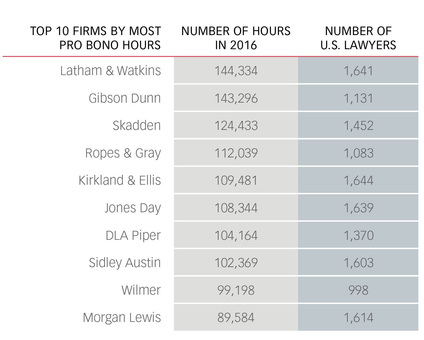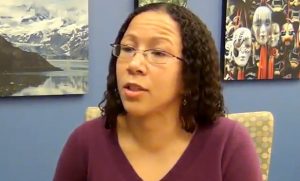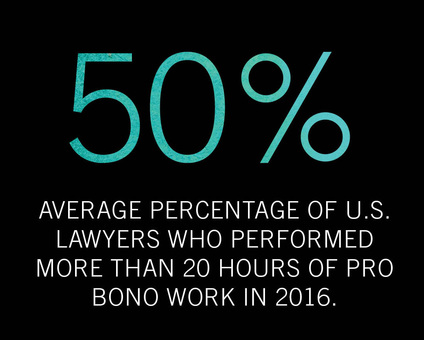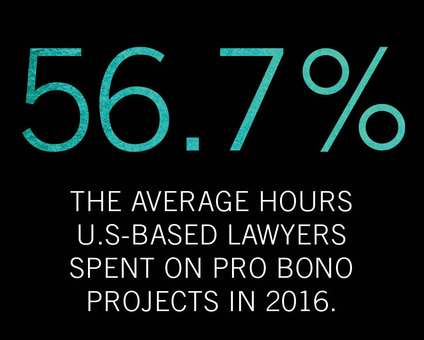Counting the hours: which law firms are most committed to pro bono?
The world's largest law firms spent millions of hours on pro bono in 2016, increasing the amount of time they spent for indigent clients around the globe
July 05, 2017 at 06:28 AM
14 minute read
The world's largest law firms spent millions of hours on pro bono in 2016, increasing the amount of time they spent for indigent clients around the globe
After dropping off the top spot last year, Jenner & Block ranked first among Big Law firms in 2016 for US pro bono commitment, while Dechert again beat other firms for its international pro bono efforts, according to The American Lawyer's latest Pro Bono Survey.
The top 10 spots in the US pro bono rankings contain many returning names. Hughes Hubbard & Reed came in second place after leading the pack last year. Irell & Manella and Patterson Belknap Webb & Tyler stayed in the top five. But Dechert, Shearman & Sterling and Debevoise & Plimpton upped their game enough to make the top 10, and Robins Kaplan and Arnold & Porter fell out of the top five to 16th and 12th, respectively.
The American Lawyer's list aims to assess The Am Law 200′s commitment to pro bono, ranking firms on a metric based on the average number of pro bono hours worked by each of their lawyers and on the percentage of lawyers at the firm who spent at least 20 hours on pro bono matters in 2016. The domestic pro bono rankings relate to work done by lawyers in the US, while the international rankings focus on pro bono work by lawyers at US firms who are based in offices outside of the country.
Here are a few key findings from the 2017 survey:
Am Law 200 lawyers dedicated slightly more time to pro bono matters last year than they did the year before. The firms that responded to the survey logged a total of more than 5.3 million hours on domestic and international pro bono in 2016. The percentage of lawyers who contributed more than 20 pro bono hours was also up, even though last year's survey saw that figure at its highest level since 2009.
 Pro bono work in 2016 touched on a wide range of issues, with firms working to combat human and wildlife trafficking, stepping into death penalty cases and advocating for children in foster care. While there was a great variety of individual projects handled, a few core themes emerged, with firms spending a significant portion of their pro bono hours on matters in three categories: immigration and asylum work, clemency petitions and criminal justice reform, and voting rights cases. Law firms also increased the amount of time their lawyers outside of the US spent on pro bono in 2016, but international pro bono still falls short of domestic efforts. The average international pro bono score was roughly 40% of the average US score.
Pro bono work in 2016 touched on a wide range of issues, with firms working to combat human and wildlife trafficking, stepping into death penalty cases and advocating for children in foster care. While there was a great variety of individual projects handled, a few core themes emerged, with firms spending a significant portion of their pro bono hours on matters in three categories: immigration and asylum work, clemency petitions and criminal justice reform, and voting rights cases. Law firms also increased the amount of time their lawyers outside of the US spent on pro bono in 2016, but international pro bono still falls short of domestic efforts. The average international pro bono score was roughly 40% of the average US score.
Almost all firms have a dedicated pro bono coordinator in-house and allow associates to count pro bono work toward their yearly billable hour requirements. And more than half of firms – 51% – said they sponsored pro bono fellowships, up from 49% last year.
Walking through the numbers
Overall, commitment to pro bono among Am Law 200 firms remained relatively steady in 2016, with slight increases in both the average number of hours that lawyers spent on pro bono projects and the percentage of lawyers who performed at least 20 hours of pro bono work. In 2016, US-based lawyers spent an average of 56.7 hours on pro bono projects, a slight increase from the 54.1 hours that lawyers averaged in the prior year. Among the firms surveyed, half of the lawyers clocked at least 20 hours of pro bono during 2016, up from 47.3% in last year's survey.
 Those modest gains are in line with the prevailing trend during the past five years or so, according to Eve Runyon (pictured), president and CEO of the Pro Bono Institute. "We have found that law firm pro bono hours have remained fairly steady," she says.
Those modest gains are in line with the prevailing trend during the past five years or so, according to Eve Runyon (pictured), president and CEO of the Pro Bono Institute. "We have found that law firm pro bono hours have remained fairly steady," she says.
Runyon adds, however, that it is not uncommon to see an increase in a given year and that an uptick in pro bono hours can stem from a range of factors. Law firms may tweak their internal programmes to make it easier for lawyers to record their hours or give them greater incentive to perform pro bono, or some issues may increase in visibility and generate more energy among the private legal community. For example, Runyon notes, in national election years such as 2016, lawyers direct more attention to election and voting rights issues. "Definitely in an election year, you see more law firms engaged in election protection," she says.
Engagement levels were high at Jenner & Block, which came out on top of the US pro bono rankings. Its lawyers put in an average of 141 hours in 2016, and more than 95% clocked at least 20 hours. The firm's most significant pro bono matter in 2016 was a court challenge of North Carolina's controversial 'bathroom bill', which specified that in the state's government buildings, people could only use bathrooms and changing facilities that matched the sex on their birth certificates. Jenner & Block lawyers, teaming with Lambda Legal, put more than 1,800 hours toward the case, which resulted in a ruling by a federal district court in Winston-Salem that the bathroom law discriminated against transgender students and employees using North Carolina's public facilities.
Andrew Vail, a litigation partner and co-chair of pro bono for Jenner & Block, says the firm's place at the top of the American Lawyer rankings comes in light of a longstanding commitment at the firm to LGBT rights cases, along with immigration rights and death penalty cases. He also noted that even Jenner & Block's transactional lawyers take part in pro bono at a rate that some might find surprising.
Among other projects in 2016, the firm handled a transactional matter pro bono for the Young Center, a non-profit focused on promoting the interests of immigrant children who arrive unaccompanied to the US. Jenner & Block lawyers spent more than 216 hours guiding the centre through a spinoff to become a freestanding nonprofit, after it had been sponsored for roughly a decade by The Tides Center.
While Jenner & Block does expect all of its lawyers to perform pro bono, Vail says that's just part of the reason the firm is so active in the pro bono sphere. Beyond firm policy, pro bono is such a piece of Jenner & Block's inner fabric that some lawyers come to the firm in part because of their interest in pro bono, he says. "We're very proud, and not in the ranking itself, but that it's a reflection of and a recognition that pro bono is in Jenner & Block's DNA," says Vail. "And, as the firm has grown in size, diversity, reach and practice, our pro bono programme – and its numbers, impact and scope – has grown."
 Other standouts in 2016 include second-ranked Hughes Hubbard, where 100% of lawyers did at least 20 hours of pro bono, averaging 131.4 hours each, and international pro bono leader Dechert, where virtually all lawyers did at least 20 hours and US lawyers averaged more than 107 pro bono hours. "We've ratcheted up the focus in recent years to get the maximum impact from our hours," says Hughes Hubbard chairman Theodore Mayer, who also noted that the firm expects lawyers to put 50 or more hours toward pro bono. "That dovetails very much with other goals like letting our lawyers work on things that they are really passionate about and training associates very well."
Other standouts in 2016 include second-ranked Hughes Hubbard, where 100% of lawyers did at least 20 hours of pro bono, averaging 131.4 hours each, and international pro bono leader Dechert, where virtually all lawyers did at least 20 hours and US lawyers averaged more than 107 pro bono hours. "We've ratcheted up the focus in recent years to get the maximum impact from our hours," says Hughes Hubbard chairman Theodore Mayer, who also noted that the firm expects lawyers to put 50 or more hours toward pro bono. "That dovetails very much with other goals like letting our lawyers work on things that they are really passionate about and training associates very well."
Among other projects, Hughes Hubbard devoted substantial time – 3,876.2 hours – to prisoner rights issues, representing prisoners in 10 civil rights federal court cases. In six of those cases, the firm secured financial settlements for its pro bono clients, while in another, Hughes Hubbard's lawyers helped protect a Muslim prisoner's right to pray in prison recreation yards, the firm reported in its survey response.
Dechert, for its part, had significant matters in the voting rights realm, with the firm's lawyers spending 5,800 hours challenging voter identification laws in multiple states, according to the survey. Three of those cases, contesting laws in Texas, Wisconsin and Kansas, resulted in successful outcomes at federal appeals courts, which found that the laws put certain voters at a disadvantage – based either on their race or ability to obtain IDs – and impinged their ability to vote.
In Texas, for one, Dechert represented the state's conference of NAACP branches and the Mexican American Legislative Caucus, securing a July 2016 ruling from the US Court of Appeals for the Fifth Circuit that a voter ID law passed in 2011 had the effect of discriminating against black and Latino voters. In April 2017, a federal district court ruled for Dechert's pro bono clients on a remaining issue in the litigation, finding that the Texas state legislature also passed the law with the intent to discriminate.
Suzanne Turner, who chairs Dechert's pro bono practice, says her firm's approach to pro bono allows for individual lawyers to pursue projects they have a passion for, but that Dechert also looks for economies of scale that would allow it to make the largest impact possible in its pro bono projects. "We do that by either taking on a case that might have wider impact… or taking on a lot of individual cases in a specific area," Turner says.
Immigration, voting rights and criminal justice
Several firms devoted significant time to immigration and asylum work, voting rights cases, and clemency petitions and criminal justice reform, according to the survey responses.
Am Law 200 firms advocated on behalf of individual women and children detained as undocumented immigrants in the US, as well as taking on international projects focused on refugee crises in the EU and Middle East. Latham & Watkins, for instance, offered counselling on international law that helped the International Rescue Committee – a global humanitarian organisation focused on refugee rights – make recommendations to EU officials in the midst of crafting a strategy to regulate the flow of displaced Syrians into Europe. "Immigration still seems to have the most number of hours," says Vilia Hayes, the chair of pro bono at Hughes Hubbard. "That comes from where there's a big need for representation."
As the national election cycle played out in 2016, firms also took on a number of voting rights cases and devoted time to staffing phone banks on election day to help voters who faced obstacles at the polls. In addition to the 5,800 hours Dechert put toward its voting rights efforts, at least three other firms – Covington & Burling, Kirkland & Ellis and Lowenstein Sandler – devoted more than 1,000 pro bono hours to voting rights in 2016. Covington, for one, put in 6,444 hours challenging a restrictive voter identification law in Alabama, alleging that it served to discriminate against black and Latino voters in the state. The case remains pending in federal district court in Tuscaloosa.
 In the criminal justice arena, many firms continued their efforts on the Clemency Project 2014, an initiative that brought together thousands of lawyers to review clemency petitions for non-violent offenders who likely would have received shorter sentences under current sentencing guidelines. The project was established to take advantage of an Obama administration initiative that invited clemency petitions from inmates that met certain qualifications; in light of President Donald Trump's departure from the prior administration's criminal justice policies, 2016 effectively marked the Clemency Project's last year.
In the criminal justice arena, many firms continued their efforts on the Clemency Project 2014, an initiative that brought together thousands of lawyers to review clemency petitions for non-violent offenders who likely would have received shorter sentences under current sentencing guidelines. The project was established to take advantage of an Obama administration initiative that invited clemency petitions from inmates that met certain qualifications; in light of President Donald Trump's departure from the prior administration's criminal justice policies, 2016 effectively marked the Clemency Project's last year.
Six firms in the survey – Ballard Spahr, DLA Piper, Jones Day, Kirkland & Ellis, Wilmer Cutler Pickering Hale and Dorr and Winston & Strawn – put at least 3,000 hours toward Clemency Project work, with Ballard Spahr, Jones Day and WilmerHale spending at least 5,000 hours on the project. The survey responses show those hours had an impact: Ballard Spahr drafted more than 50 clemency petitions and saw 29 of them granted; DLA Piper drafted 39 and saw 15 granted; Jones Day drafted 88 and had 18 granted; Kirkland drafted 53 and had 16 granted; and Wilmer drafted 66 petitions, 12 of which were granted.
Looking ahead
While pro bono efforts at large law firms picked up steam in 2016, a murky future lies ahead for the populations and organisations those projects usually aim to serve. Runyon of the Pro Bono Institute says that, while law firms have shown a "wonderful" commitment to pro bono that has remained consistent during the past several years, the legal services and other nonprofit groups they often partner with are facing a potentially troubling landscape. It remains to be seen what Congress might put toward the government-funded Legal Services Corp, but the latest budget proposal from the Trump administration would entirely cut off funding to the organisation.
With possible funding threats looming, Runyon says private law firms and corporate legal departments could step in to fill some of the gap with pro bono. Runyon says she expects to see continued need for pro bono assistance in the realm of immigration and asylum law, as well as increased attention to cases involving LGBT rights and climate change, issues that have come to the fore in recent years. But she also says that some perennial issues, ranging from landlord-tenant disputes to criminal cases, are not going away any time soon.
"There's a tremendous amount of anxiety among the legal services community," she says. "It's critical for law firms to continue to address not just emerging needs such as climate change … but the bread and butter issues, like landlord-tenant [matters]."
Seyfarth Shaw pro bono and philanthropy partner Allegra Nethery forecasts that The American Lawyer's next survey will show a surge in pro bono hours and participation among large law firms – particularly in areas where government enforcement and policy priorities put strain on the low income and vulnerable people who are often the clients in pro bono matters. "I would predict that participation numbers will be significantly higher. I've seen in my own firm and heard from my counterparts at other firms that lawyers who had not previously done pro bono work are now actively seeking out those opportunities," says Nethery. "Areas of focus in addition to immigration are likely to include voting rights, LGBTQ rights and women's reproductive rights."
Echoing Runyon, Nethery also takes a similar view on the challenges that legal aid groups face, stressing that "there is simply no substitute for the frontline legal services organisations" that serve low income and vulnerable populations.
"There seems to be a misconception in Washington that, if the Legal Services Corp is eliminated or has its funding reduced, private attorneys in law firms can just fill the gap," says Nethery. "Large firm pro bono programmes rely on legal services organisations to do community outreach to find the clients, to screen the clients for eligibility, and to train and mentor our volunteer lawyers. We simply could not do the amount and type of pro bono work reflected in your survey without them."
This content has been archived. It is available through our partners, LexisNexis® and Bloomberg Law.
To view this content, please continue to their sites.
Not a Lexis Subscriber?
Subscribe Now
Not a Bloomberg Law Subscriber?
Subscribe Now
NOT FOR REPRINT
© 2025 ALM Global, LLC, All Rights Reserved. Request academic re-use from www.copyright.com. All other uses, submit a request to [email protected]. For more information visit Asset & Logo Licensing.
You Might Like
View All
DeepSeek and the AI Revolution: Why One Legal Tech Expert Is Hitting Pause
4 minute read
What Happens When a Lateral Partner's Guaranteed Compensation Ends?

Lawyers React To India’s 2025 Budget, Welcome Investment And Tax Reform

Russia’s Legal Sector Is Changing as Western Sanctions Take Their Toll
5 minute readTrending Stories
- 1States Accuse Trump of Thwarting Court's Funding Restoration Order
- 2Microsoft Becomes Latest Tech Company to Face Claims of Stealing Marketing Commissions From Influencers
- 3Coral Gables Attorney Busted for Stalking Lawyer
- 4Trump's DOJ Delays Releasing Jan. 6 FBI Agents List Under Consent Order
- 5Securities Report Says That 2024 Settlements Passed a Total of $5.2B
Who Got The Work
J. Brugh Lower of Gibbons has entered an appearance for industrial equipment supplier Devco Corporation in a pending trademark infringement lawsuit. The suit, accusing the defendant of selling knock-off Graco products, was filed Dec. 18 in New Jersey District Court by Rivkin Radler on behalf of Graco Inc. and Graco Minnesota. The case, assigned to U.S. District Judge Zahid N. Quraishi, is 3:24-cv-11294, Graco Inc. et al v. Devco Corporation.
Who Got The Work
Rebecca Maller-Stein and Kent A. Yalowitz of Arnold & Porter Kaye Scholer have entered their appearances for Hanaco Venture Capital and its executives, Lior Prosor and David Frankel, in a pending securities lawsuit. The action, filed on Dec. 24 in New York Southern District Court by Zell, Aron & Co. on behalf of Goldeneye Advisors, accuses the defendants of negligently and fraudulently managing the plaintiff's $1 million investment. The case, assigned to U.S. District Judge Vernon S. Broderick, is 1:24-cv-09918, Goldeneye Advisors, LLC v. Hanaco Venture Capital, Ltd. et al.
Who Got The Work
Attorneys from A&O Shearman has stepped in as defense counsel for Toronto-Dominion Bank and other defendants in a pending securities class action. The suit, filed Dec. 11 in New York Southern District Court by Bleichmar Fonti & Auld, accuses the defendants of concealing the bank's 'pervasive' deficiencies in regards to its compliance with the Bank Secrecy Act and the quality of its anti-money laundering controls. The case, assigned to U.S. District Judge Arun Subramanian, is 1:24-cv-09445, Gonzalez v. The Toronto-Dominion Bank et al.
Who Got The Work
Crown Castle International, a Pennsylvania company providing shared communications infrastructure, has turned to Luke D. Wolf of Gordon Rees Scully Mansukhani to fend off a pending breach-of-contract lawsuit. The court action, filed Nov. 25 in Michigan Eastern District Court by Hooper Hathaway PC on behalf of The Town Residences LLC, accuses Crown Castle of failing to transfer approximately $30,000 in utility payments from T-Mobile in breach of a roof-top lease and assignment agreement. The case, assigned to U.S. District Judge Susan K. Declercq, is 2:24-cv-13131, The Town Residences LLC v. T-Mobile US, Inc. et al.
Who Got The Work
Wilfred P. Coronato and Daniel M. Schwartz of McCarter & English have stepped in as defense counsel to Electrolux Home Products Inc. in a pending product liability lawsuit. The court action, filed Nov. 26 in New York Eastern District Court by Poulos Lopiccolo PC and Nagel Rice LLP on behalf of David Stern, alleges that the defendant's refrigerators’ drawers and shelving repeatedly break and fall apart within months after purchase. The case, assigned to U.S. District Judge Joan M. Azrack, is 2:24-cv-08204, Stern v. Electrolux Home Products, Inc.
Featured Firms
Law Offices of Gary Martin Hays & Associates, P.C.
(470) 294-1674
Law Offices of Mark E. Salomone
(857) 444-6468
Smith & Hassler
(713) 739-1250









